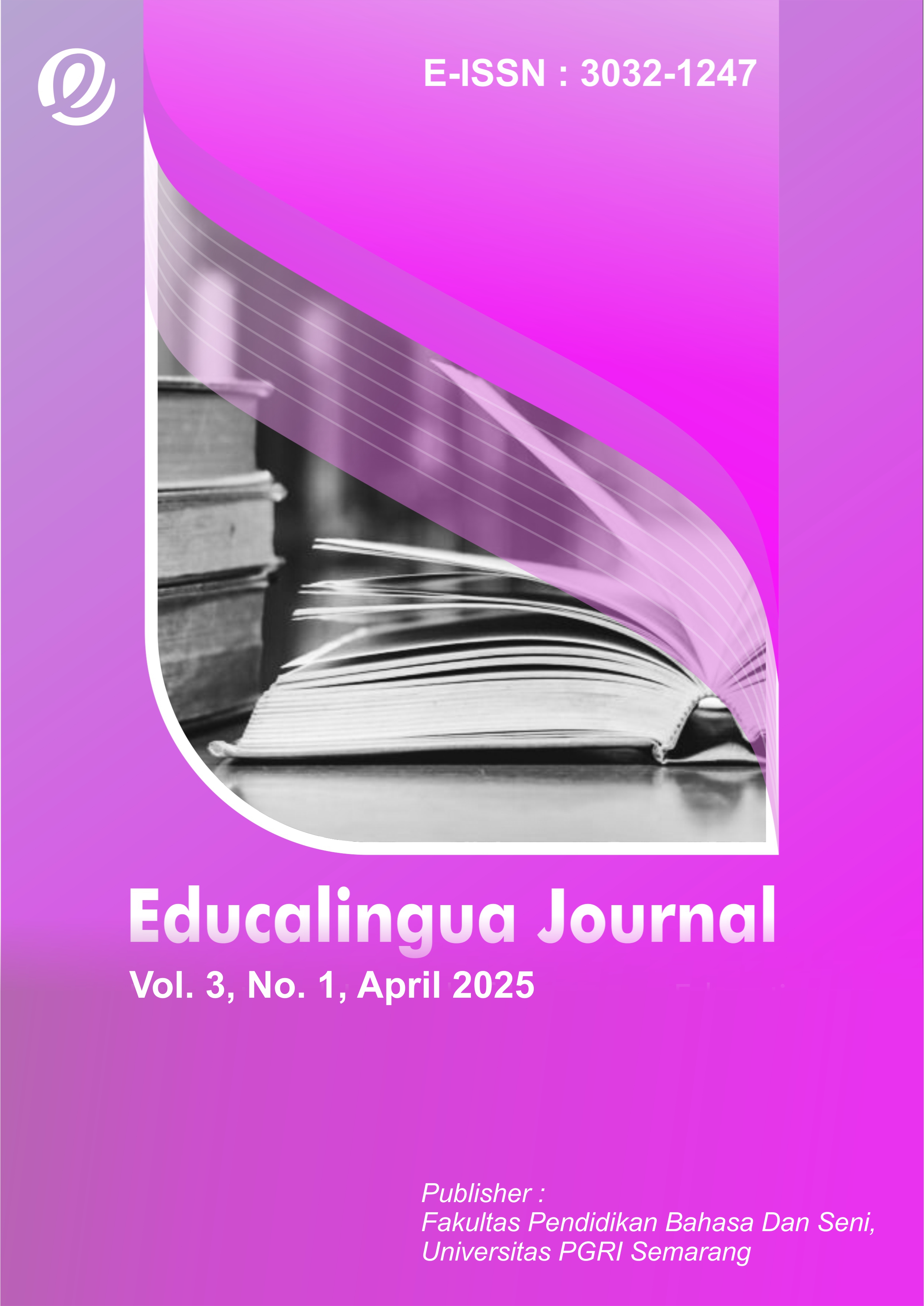The Role of Self-Regulated Motivation in Fostering EFL Learners’ Academic Writing Skills
DOI:
https://doi.org/10.26877/educalingua.v3i1.1841Keywords:
Self-regulated motivation, academic writing, EFL learners, library investigation, thematic analysisAbstract
This study highlights the importance of fostering strong self-regulated motivation in EFL learners before engaging them in complex academic writing tasks. Drawing from educational psychology, it emphasizes how motivation plays a key role in navigating the challenges of academic writing. This small-scale library research aimed to explore how self-regulated motivation supports the development of academic writing skills among EFL learners. Through thematic analysis of 25 relevant studies, the research identified two key findings: (1) self-regulated motivation helps EFL learners become more organized in their writing process, and (2) it contributes to better academic writing outcomes. Overall, the study reinforces the need for educators to prioritize motivation in academic writing instruction.
References
Abadikhah, S., Aliyan, Z., & Talebi, S. H. (2018). EFL students’ attitudes towards self-regulated learning strategies in academic writing. Issues in Educational Research, 28(1), 1–17. https://search.informit.org/
Bai, B., & Guo, W. (2021). Motivation and self-regulated strategy use: Relationships to primary school students’ English writing in Hong Kong. Language Teaching Research, 25(3), 378–399. https://doi.org/10.1177/1362168819859921
Bai, B., & Wang, J. (2023). Conceptualizing self-regulated reading-to-write in ESL/EFL writing and investigating its relationships to motivation and writing competence. Language Teaching Research, 27(5), 1193–1216. https://doi.org/10.1177/1362168820971740
Braun, V., & Clarke, V. (2021). Conceptual and Design Thinking for Thematic Analysis. Qualitative Psychology Journal, 9(1), 3–26. file:///Users/ksiamisang/Desktop/mark.pdf.
Brenner, C. A. (2022). Self-regulated learning, self-determination theory and teacher candidates’ development of competency-based teaching practices. Smart Learning Environments Journal, 9(1), 3-22. https://doi.org/10.1186/s40561-021-00184-5
Brún, C. De. (2023). A Critical Approach to Overcoming Resistance to Academic Writing and Building Confidence in Third Level Students. All Ireland Journal of Teaching and Learning in Higher Education, 15(1), 1–20. https://doi.org/10.62707/aishej.v15i1.729
DiFrancesca, D., Nietfeld, J. L., & Cao, L. (2016). A comparison of high and low achieving students on self-regulated learning variables. Learning and Individual Differences Journal, 45(6), 228–236. https://doi.org/10.1016/j.lindif.2015.11.010
Djatmika, Prihandoko, L. A., & Nurkamto, J. (2022). Students’ Profiles in the Perspectives of Academic Writing Growth. International Journal of Instruction, 15(3), 117–136. https://eric.ed.gov/
Elkot, M. A., & Ali, R. (2020). Enhancing self-regulated learning strategy via Handheld devices for improving english writing skills and motivation. International Journal of Information and Education Technology, 10(11), 805–812. https://doi.org/10.18178/ijiet.2020.10.11.1462
Endres, T., Lovell, O., Morkunas, D., Rieß, W., & Renkl, A. (2023). Can prior knowledge increase task complexity? – Cases in which higher prior knowledge leads to higher intrinsic cognitive load. British Journal of Educational Psychology, 93(2), 305–317. https://doi.org/10.1111/bjep.12563
Francielle Nascimento Merett, Jose Aloyseo Bzuneck, Ktya Luciane de Oliveira, & S. E. R. (2020). University students profiles of self-regulated learning and motivation. Educational Psychology Journal, 37(8), 1–10. https://www.scielo.br/
Griffiths, S., Suksasilp, C., Lucas, L., Sebastian, C. L., & Norbury, C. (2021). Relationship between early language competence and cognitive emotion regulation in adolescence. Royal Society Open Science, 8(10), 1–11. https://doi.org/10.1098/rsos.210742
Guo, W., & Bai, B. (2022). Effects of self-regulated learning strategy use on motivation in EFL writing: A comparison between high and low achievers in Hong Kong primary schools. Applied Linguistics Review, 13(1), 117–139. https://doi.org/10.1515/applirev-2018-0085
Han, J., & Hiver, P. (2018). Genre-based L2 writing instruction and writing-specific psychological factors: The dynamics of change. Journal of Second Language Writing, 40(3), 44–59. https://doi.org/10.1016/j.jslw.2018.03.001
Klassen, A. C., Creswell, J., Plano Clark, V. L., Smith, K. C., & Meissner, H. I. (2012). Best practices in mixed methods for quality of life research. Quality of Life Research, 21(3), 377–380. https://doi.org/10.1007/s11136-012-0122-x
Lim, S. L., & Yeo, K. J. (2021). A systematic review of the relationship between motivational constructs and self-regulated learning. International Journal of Evaluation and Research in Education, 10(1), 330–335. https://doi.org/10.11591/IJERE.V10I1.21006
Mbato, C. L., & Cendra, A. (2019). EFL undergraduate students self-regulation in thesis writing. Journal of English Language and Education, 5(1), 66–82.
Md Nen, Z., Kamarunzaman, N. Z., Abdul Karim, M. F. Bin, Vadeveloo, T., & Shanthi, A. (2022). Exploring the Relationship Between Motivational Beliefs and Self-Regulated Learning. International Journal of Social Science Research, 11(1), 43-60. https://doi.org/10.5296/ijssr.v11i1.20318
Nabhan, S. (2019). Pre-Service Teachers’ Self-Regulated Learning Strategy, Motivation, and Revision Behaviors in Efl Academic Writing. Jurnal Pendidikan Bahasa, 8(2), 193-209. https://doi.org/10.31571/bahasa.v8i2.1451
Nowell, L. S., Norris, J. M., White, D. E., & Moules, N. J. (2017). Thematic Analysis: Striving to Meet the Trustworthiness Criteria. International Journal of Qualitative Methods, 16(1), 1–13. https://doi.org/10.1177/1609406917733847
Nückles, M., Roelle, J., Glogger-Frey, I., Waldeyer, J., & Renkl, A. (2020). The Self-Regulation-View in Writing-to-Learn: Using Journal Writing to Optimize Cognitive Load in Self-Regulated Learning. Educational Psychology Review, 32(4), 1089–1126. https://doi.org/10.1007/s10648-020-09541-1
Panadero, E. (2017). A review of self-regulated learning: Six models and four directions for research. Frontiers in psychology Journal, 8(3), 1-28. https://www.frontiersin.org/
Sekar Diasti, K., & Laos Mbato, C. (2020). Exploring Undergraduate Students’ Motivation-regulation Strategies in Thesis Writing. Language Circle: Journal of Language and Literature, 14(2), 1-8. http://journal.unnes.ac.id/nju/index.php/LC
Shen, B., & Bai, B. (2024). Enhancing Chinese university students’ writing performance and self-regulated learning (SRL) writing strategy use through a strategy-based intervention. System, 122(6), 1-17. https://doi.org/10.1016/j.system.2024.103249
Suanthong, D. (2023). The Effectiveness of the Growth Mindset Program in Developing the Projects Proposal Writing Skills. Journal of Education and Learning, 12(1), 102-107. https://doi.org/10.5539/jel.v12n1p102
Sun, T., & Wang, C. (2020). College students’ writing self-efficacy and writing self-regulated learning strategies in learning English as a foreign language. Elsevier Journal, 90,(10), 1-17. https://doi.org/10.1016/j.system.2020.102221
Teng, L. S. (2024). Individual differences in self-regulated learning: Exploring the nexus of motivational beliefs, self-efficacy, and SRL strategies in EFL writing. Language Teaching Research Journal, 28(2), 366–388. https://doi.org/10.1177/13621688211006881
Teng, L. S., & Zhang, L. J. (2018). Effects of motivational regulation strategies on writing performance: a mediation model of self-regulated learning of writing in English as a second/foreign language. Metacognition and Learning Journal, 13(2), 213–240. https://doi.org/10.1007/s11409-017-9171-4
Teng, L. S., & Zhang, L. J. (2022). Can self-regulation be transferred to second/foreign language learning and teaching? Current status, controversies, and future directions. Applied Linguistics Journal, 43(3), 587-595. https://doi.org/10.1093/applin/amab032
Teng, M. F., & Wang, C. (2023). Assessing academic writing self-efficacy belief and writing performance in a foreign language context. Foreign Language Annals, 56(1), 144–169. https://doi.org/10.1111/flan.12638
Teng, M. F., Wang, C., & Zhang, L. J. (2022). Assessing self-regulatory writing strategies and their predictive effects on young EFL learners’ writing performance. Assessing Writing Journal, 51(9), 1–16. https://doi.org/10.1016/j.asw.2021.100573
Theobald, M. (2021). Self-Regulated Learning Training Programs Enhance University
Students’ Academic Performance, Self-Regulated Learning Strategies, and Motivation:A Meta-Analysis. Contemporary Educational Psychology Journal, 66(11), 1-24. https://doi.org/10.1016/j.cedpsych.2021.101976
Tubaon, M., & Palma, R. (2022). Active Reading Style, Student Vocabulary Learning Strategies and Self-regulated Learning: A Structural Model Equation on Academic Writing Motivation and Self-regulation. Asian Journal of Education and Social Studies, 36(4), 53–63. https://doi.org/10.9734/ajess/2022/v36i4790
Udvardi-Lakos, N., Endres, T., Glogger-Frey, I., & Renkl, A. (2023). Engaging in writing to learn – Increasing the motivation during a long-term self-regulated learning training. Frontiers in Education, 7(1), 1–14. https://doi.org/10.3389/feduc.2022.1067347
Umamah, A., & Cahyono, B. Y. (2022). EFL University Students’ Use of Online Resources to Facilitate Self-Regulated Writing. Call-Ej, 23(1), 108–124. https://callej.org/
Wijaya, K. F., & Setiawan, N. A. (2021). Graduate Students’ Motivation Regulation Strategies in Facing Academic Writing Amid Covid-19 Pandemic. LLT Journal: Journal on Language and Language Teaching, 24(2), 597–613. https://doi.org/10.24071/llt.v24i2.3142
Wilby, J. (2022). Motivation, self-regulation, and writing achievement on a university foundation programme: A programme evaluation study. Language Teaching Research, 26(5), 1010–1033. https://doi.org/10.1177/1362168820917323
Yenti, D. (2022). College students ’ attributions of their academic success and failure in writing skill. Jurnal Edukasi STKIP Abdi Pendidikan Payakumbuh, 2(1), 21–29. https://mail.jurnaledukasi.stkipabdi.ac.id/
Zander, L., Brouwer, J., Jansen, E., Crayen, C., & Hannover, B. (2018). Academic self-efficacy, growth mindsets, and university students’ integration in academic and social support networks. Learning and Individual Differences Journal, 6(2), 98–107. https://doi.org/10.1016/j.lindif.2018.01.012
Zhang, D., & Zhang, L. J. (2019). Metacognition and Self-Regulated Learning ( SRL ) in Second / Foreign Metacognition and Self-Regulated Learning ( SRL ) in Second / Foreign Language Teaching, 8(4), 1–15. https://doi.org/10.1007/978-3-319-58542-0
Zhang, Y., Tian, Y., Yao, L., Duan, C., Sun, X., & Niu, G. (2022). Individual differences matter in the effect of teaching presence on perceived learning: From the social cognitive perspective of self-regulated learning. Computers & Education Journal, 17(9), 1-16. https://doi.org/10.1016/j.compedu.2021.104427
Zarei Hajiabadi, Z., Gandomkar, R., Ashrafifard, H., & Sandars, J. (2023). Self‐Regulated Learning Diary Interventions and the Implications for Health Professions Education. Education Research International Journal, 23(1), 1-18. https://doi.org/10.1155/2023/6783878
Zimmerman, B. J. (2002). Becoming a self-regulated learner: An overview. Theory into practice Journal, 41(2), 64-70. https://doi.org/10.1207/s15430421tip4102_2








